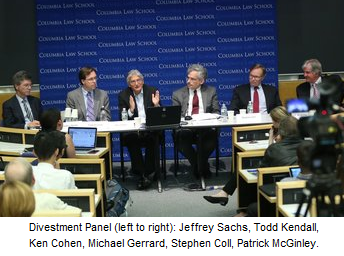Anna LoPresti
Sabin Center Summer Intern
On July 9th 2015, the Columbia Center on Sustainable Investment (CCSI) co-sponsored a panel discussion in conjunction with the Sabin Center and the Sustainable Development Solutions Network on the topic: “A Safe Future for Fossil Fuel Investments in a Carbon-Constrained World?” The panel—featuring Earth Institute director Jeffrey Sachs and ExxonMobil Vice President Ken Cohen— was convened to discuss what a “safe” or “environmentally responsible” investment in fossil fuels looks like, given the industry’s contribution to global climate change. A video of the panel is available here.
Since 2010, the fossil fuel divestment movement has gained traction as a way to shift the paradigm toward environmentally and socially responsible energy production. Thirty-four colleges and universities worldwide have divested from fossil fuels in some capacity, in addition to 44 cities, two United States counties, and over 100 foundations. As the movement continues to grow, debates over the efficacy of the strategy have ensued. On November 24th, 2014, Columbia Law School hosted a panel discussion titled “Should Universities and Pension Funds Divest From Fossil Fuel Stocks?” Building off of this original discussion, the recent panel “is not about whether to divest, but from whom to divest,” according to moderator and Sabin Center Faculty Director Michael Gerrard. The event opened with statements by each of the panel members.
Jeffrey Sachs—who in addition to his role as Director of the Earth Institute also serves as special advisor to the UN Secretary-General Ban Ki-moon and Director of the UN Sustainable Development Solutions Network—opened his statement by emphasizing the necessity of cutting greenhouse gas emissions to stay below the 2 degree Celsius temperature rise limit set by the United Nations. He stated that decarbonization of the energy system in the second half of the 21st century is required, ideally reaching net zero carbon emissions by 2070. However, the global community is not on track to reach this target due in part to a lack of will power to abandon fossil fuels and in part to “manufactured confusion” of the public regarding climate science. Sachs concluded his statement with the fact that “we already have more than all the fossil fuels we could safely burn by quite a large margin” and therefore must stop discovering and tapping additional fossil fuel reserves immediately. In a recent op-ed co-authored by CCSI director Lisa Sachs, Jeffrey Sachs suggested criteria for selective divestment from irresponsible fossil fuel companies. However, in the piece as in the panel, Sachs suggested shareholder engagement with the energy industry as an accountability measure for fossil fuel companies that are actively trying to reach the 2 degree goal.
Sachs was followed by Ken Cohen, Vice President of Public and Government Affairs of ExxonMobil, who focused on the company’s energy outlook projections and the continuingly large role fossil fuels play in meeting global energy demand. According to Exxon’s energy outlook, the company has a plan that leads to a global temperature rise of 2.4 degrees Celsius—higher than the established limit. Cohen cited an MIT study detailing the economic costs and complexity associated with decarbonization and emissions reductions. While failing to offer a plan that would lower emissions to the point of meeting the limit or commenting on divestment, Cohen expressed his optimism about the future because of technology, later listing advanced biofuels, carbon capture and storage, and energy efficiency as viable options for improvement.
Todd Kendall, Senior Vice President of Compass Lexecon, offered his views on the economic costs and benefits of divestment. According to a paper funded by the Independent Petroleum Association of America and published earlier this year by Kendall’s associates, “there are material costs that any investor would face” as a consequence of divestment, including limiting the diversification of investors’ portfolios. Kendall followed by explaining how the benefits of divestment are “very unclear,” stating that divestment does not possess the ability to negatively impact fossil fuel companies financially or necessarily shame companies into altering their behavior. He refuted the idea that divestment may be financially prudent because the value of fossil investments may decrease in the coming years due to regulation and public perception of the industry. In rejecting this idea, he did not acknowledge that stock prices for the coal industry have already plummeted (a point made by Professor Patrick McGinley in a subsequent presentation). He summarized his statement by claiming “it is hard to support divestment from a cost-benefit perspective.”
Stephen Coll—The Dean and Henry R. Luce Professor of Journalism at Columbia University’s Graduate School of Journalism and author of “Private Empire: ExxonMobil and American Power”—addressed the socio-political dimensions of divestment campaigns. In contrast to Kendall, Coll expressed the opinion that historically divestment campaigns have been successful in changing the public consciousness, listing South African Apartheid as an example. However, when it comes to changing laws, he suggested that strategic engagement is necessary to move toward carbon pricing and budgeting, which he believes should be the end goal of the divestment campaign. Coll outlined a strategic engagement plan that includes three main components: legislative goals, which are necessary to ensure compliance with greenhouse gas emissions reductions; accountability on the part of energy companies, including accountability for “damage, confusion, and for past conduct;” and a carbon budget that allows investors to account for the portfolio holdings of the companies they invest in.
The final panelist was Patrick C. McGinley, Charles H. Haden II Professor of Law at the West Virginia University College of Law. McGinley focused on the dramatic decline in coal prices over the past few years, noting that lack of diversification and resistance to changes at the federal level were the industry’s most serious roadblocks. The number one need with regard to engagement with coal is convincing the industry’s leaders and lobbyists to admit that climate change science is real and stop touting a “war on coal.” Rather than resorting to dangerous coal mining methods like mountain top removal, companies should focus on diversification and reducing emissions, which would help the industry succeed and reduce environmental impacts. McGinley closed out the panel stating, “If the coal industry really is going to regain any semblance of its former self, the first step is simply to acknowledge the science of climate change.”
In the discussion that followed, Jeffrey Sachs expressed concern over ExxonMobil’s plan to achieve a 2.4 degree temperature increase, stating that it is possible and necessary for energy companies to meet the 2 degree goal. He also suggested that Exxon go public with the fact that they believe in the climate change science, which would help to create an environment of open dialogue. Ken Cohen responded by stating that Exxon would welcome further engagement; however, he did not share Sachs’ confidence that a 2-degree scenario was possible due to the “complexity of the problem.” Professor Gerrard also challenged Cohen regarding the fact that Exxon calculates the costs of reaching the 2-degree limit but does not consider the astronomical economic costs of failing to achieve this goal. Cohen claimed that Exxon did take this into account, in the form of informal conversations. It is not included in the cited MIT study or in the company’s financial disclosures.
In light of a recent study released by the Union of Concerned Scientists, the Question and Answer session revolved around fossil fuel company accountability and the industry’s disinformation campaign, with the majority of questions directed at Cohen. The study, which includes seven sets of internal fossil fuel company documents, reveals an extensive and deliberate disinformation campaign that has extended over the past three decades. Amy Larkin—author of the book “Environmental Debt”—inquired about how Exxon would be taking responsibility for its actions, and additionally asked when the company planned to strand its assets. Cohen responded by denying that ExxonMobil was intentionally deceiving the public and reiterated the complexity of decarbonization. He did not offer a timeframe for stranding assets. Sabin Center intern and Columbia undergrad Daniela Lapidous also challenged Cohen, asking about a timeline for incorporating renewable energy into Exxon’s portfolio. Cohen did not offer a timeline or address any specific renewable technologies. He did, however, state that the company has taken a “heavy look at storage” as well as heat containment.
While panelist opinions differed on whether and from whom to divest, the general consensus seemed to support some form of engagement with the energy industry in order to both assist and hold companies accountable for making necessary changes. Divestment and engagement are not mutually exclusive strategies—while investors have the ability to speak to the industry through divestment, experts from a wide range of disciplines including law, science, and economics can address these challenges through engagement.


